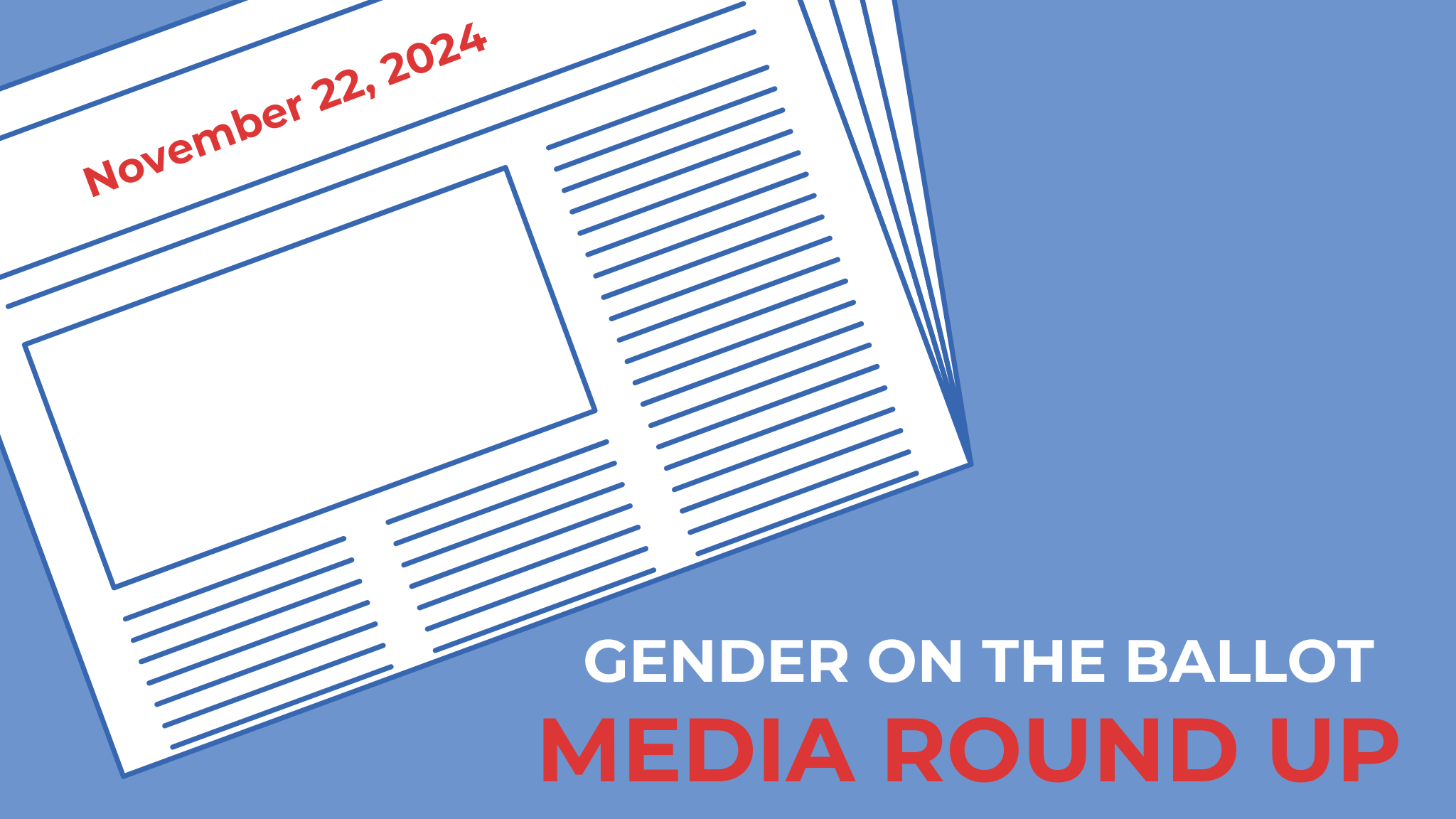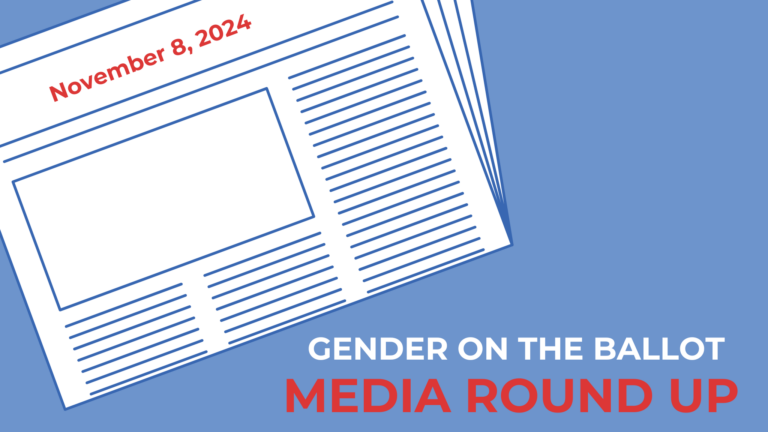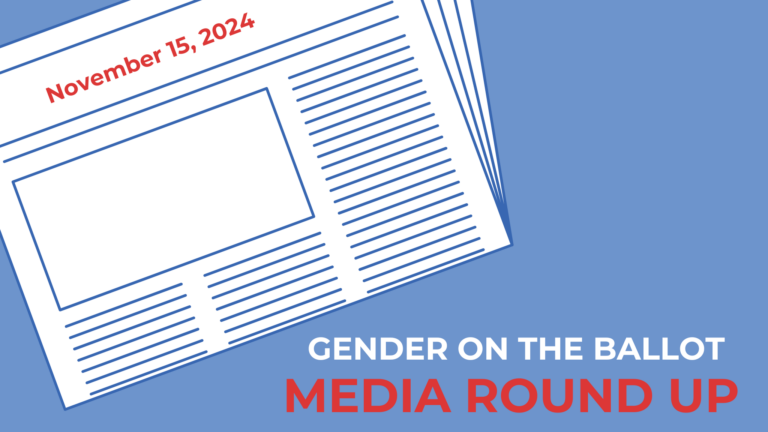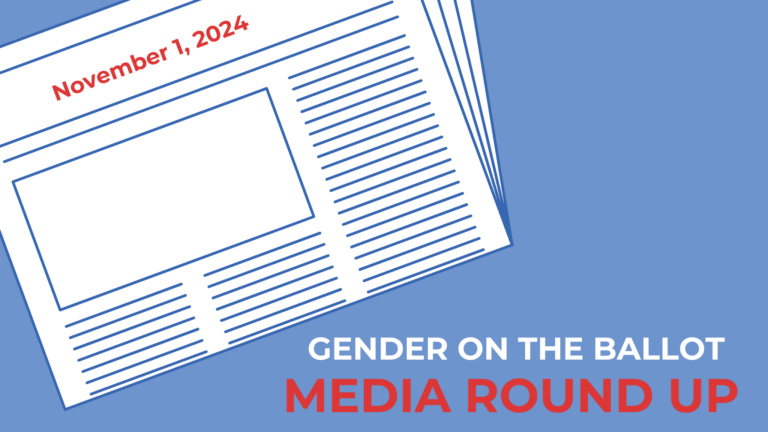Where We Stand: How to keep up with Emerging Election Results With 16 races still…
Weekly Media Round Up: November 22, 2024

Welcome to our Media Round Up. Each week we’re collecting and sharing our favorite gender + politics stories. We’ll pause this week for the Thanksgiving holiday and see you again on December 6th!
Hitting a paywall? Some sources allow a few free articles without a subscription, and your university or local library may offer free access. For example, AU students, faculty, and staff have access to popular newspapers through the library. Click here to learn more.
Should Women Be Allowed to Fight the Front Lines? Trump’s Defense Pick Reignites the Debate
Associated Press, Lolita C. Baldor
This week, President-elect Donald Trump’s nominee for defense secretary, Pete Hegseth, reignited a debate that “many thought had long been settled”: whether or not women should be allowed to serve their country and fight on the front lines. Hegseth, a former Fox News commentator, has been outspoken in his belief that men and women should not serve together in combat units; he contends that while women should have a place in the military, they should not be involved in special operations, artillery, infantry, and armor units. Should Hegseth be confirmed by the Senate, he could attempt to end the Pentagon’s nearly decade-old practice of opening all combat jobs to women. This move shines a spotlight on the culture and climate for women in the military, made all the more fraught by the release of a police report with graphic details of sexual assault allegations against the nominee that is is stoking concerns among current and former Defense Department officials that the agency could backslide on efforts to put an end to those abuses in the military.
More Women Named for the Incoming Trump Administration
President-elect Donald Trump has named three more women to significant positions in his administration as the country prepares for a second Trump presidency. Trump selected former WWE executive Linda McMahon to be the education secretary in his cabinet, extolling the “incredible” job McMahon has been doing as his transition team co-chair. McMahon, who donated a significant amount to Trump’s 2024 presidential campaign, previously served in Trump’s cabinet in his first administration as the administrator of the Small Business Administration from 2017-2019.
This week, Trump also picked Karoline Leavitt, his 2024 campaign national press secretary, to be his White House press secretary. Leavitt, 27, will soon be the youngest White House press secretary in history; she previously ran for Congress in New Hampshire in 2022 after beating out more established opponents in Republican primaries.
Trump has named a new attorney general, former Florida attorney general Pam Bondi. Bondi comes after his initial AG pick, former Rep. Matt Gaetz, withdrew from consideration. She was Florida’s AG from 2011 to 2019, and a lawyer on Trump’s impeachment trial team. Bondi also works for the America First Policy Institute, a think tank consisting of former Trump staffers.
Despite many women earning considerable media attention in the upcoming Trump administration, one woman – Melania Trump – has notably been in the spotlight “for her absence.” Though Melania was a fixture in Trump’s previous campaigns, she is now often “choosing to be unburdened by” the role of the first lady, stepping away from traditional expectations and media appearances.
From the Longest-Serving Woman to a “First,” Change is Coming to Capitol Hill
It’s a tumultuous time for Capitol Hill as much change is coming in January, but for Rep. Marcy Kaptur, it’s all too familiar. Kaptur, a Democrat representing Ohio’s 9th Congressional District, is set to start her 22nd term in January after winning over Trump-backed Rep. Derek Merrin. She continues her record of being the longest serving woman in House of Representatives history.
Congress is also welcoming its first transgender member this January. American University alumna Sarah McBride, SPA/BA ’13, won Delaware’s 1st District House seat and is set to join Capitol Hill, but Rep. Nancy Mace introduced a bill that bans transwomen from using women’s restrooms in the Capitol. Mace, a Republican representing South Carolina, doubled down on her intentions, saying the bill “absolutely” is targeted at McBride. McBride responded in turn on X, saying the bill is an attempt to distract Americans from the lack of real solutions that Americans are facing. Meanwhile, some are looking to expand the House entirely.
Conservative Democrats Rep. Marie Gluesenkamp Perez (WA), and Rep. Jared Golden (ME), are leading a nonpartisan effort to reform the House. Their reform is focused on expanding the number of House members to better represent the amount of people in each Congressional district across the country, which currently sits at about 768,000 people per one representative. They’re also advocating for nonpartisan open primaries, ways to reduce gerrymandering, and multiple-member districts.
What Happened to the Gender Gap on Election Day, and What’s Happened Since
The gender gap in this presidential election did indeed prove to be quite large, but not “notably larger” than it had been in 2020 or 2016. Election results also show that the gender gap varied by race, as white men and women voted more similarly to each other in 2024 than Black or Latino men or women: Trump made inroads with support amongst both Black and Latino men, amplifying the gap between male and women voters. The “much anticipated” gender gap among Gen Z did emerge, according to exit polls, though the numbers were not as staggering as many predicted; young men and women both shifted to the right compared to their counterparts in 2020. While Trump spent time on the 2020 campaign trail courting suburban women voters, his 2024 strategy of appealing to men seems to have worked to his advantage.
We’re starting to see the outcome of the gender gap in this election with the sharp increase of misogynistic and violent rhetoric toward women online and offline. The slogan “Your body, my choice” has exploded online after white supremacist Nick Fuentes tweeted the phrase on election night. Now, a new report shows that the phrase is being used in classrooms and schools across the country to intimidate and demean young girls. This sparks a deep-seated fear in many girls and women as they reckon with if, and when, these threats become physical. It also forces women to think about their own safety and what responses are “appropriate” for such a demeaning gesture. With the rise of this rhetoric in schools, society needs to draw clear lines about the dangers of words, even if they are a “joke” to some.
For the First Time, Women Will Outnumber Men in the Alaska House Next Year
Alaska Republic Media, Eric Stone
For the first time in its history, there will be more women than men in the Alaska House of Representatives when the legislature convenes in January. According to final unofficial election results released on Wednesday, twenty-one women will serve in the forty-member Alaska House, assuming that the winners in the unofficial tally are certified at the end of the month. Additionally, five of the Alaska Senate’s twenty seats will be held by women in the next legislature. The one woman senator up for reelection this year, Kelly Merrick (R), won her race, making the total number of female lawmakers twenty-six, which is also a record, according to Rutger’s Center for American Women and Politics.
Number of Women in Congress Stalls for the First Time Since Trump’s 2016 Election
NBC News, Bridget Bowman
The 119th Congress could feature less women than before, research shows. According to Rutgers University’s Center for American Women and Politics, 151 women were in Congress on election day, but that number could drop to 150 after final election results come in. This would be the first decline since 2010. If the number does stay at 151, this would be the first stall in progress since 2016. In 2018 and 2016, massive gains were made in Congress for women, but that fell short in 2022. Democratic women outnumber Republican women in both the House and Senate, but Republican women have made strides in recent elections with reaching 31 or 32 House members compared to just 13 in 2018. Despite making up half the population, women make up just 28% of Congress.






